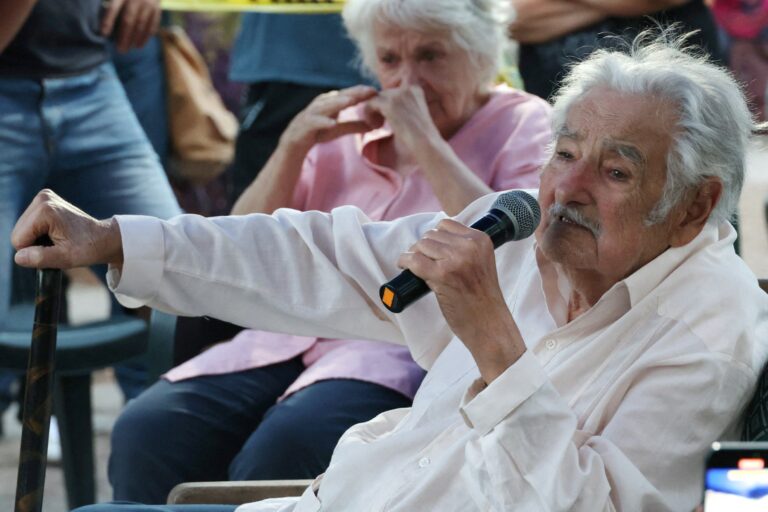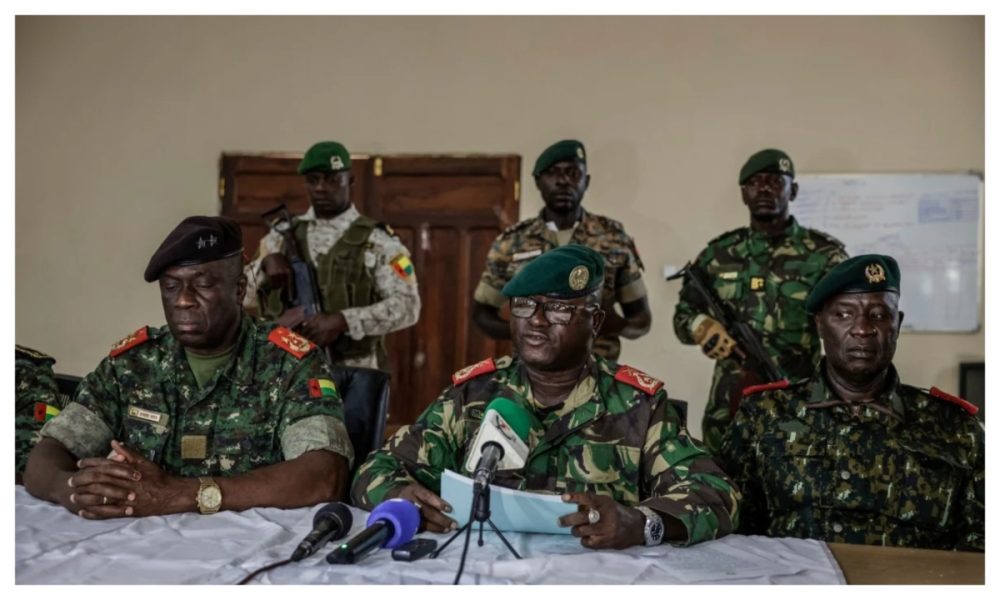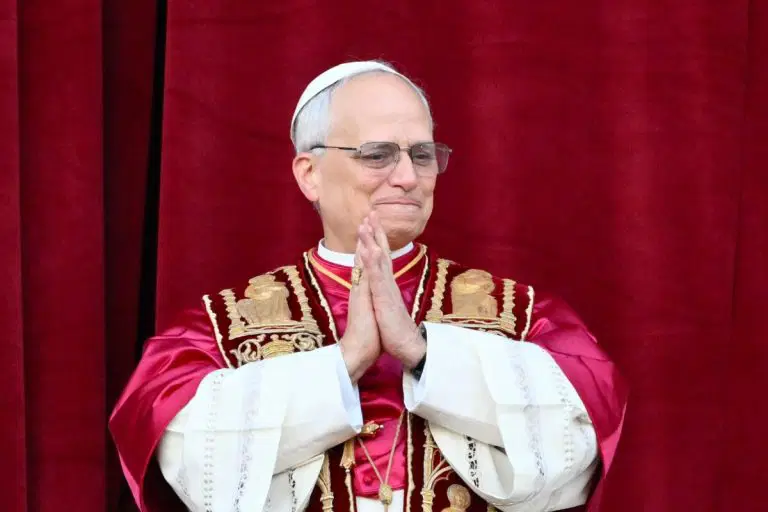Headline
Mourning, Tribute, As ‘World’s Poorest President’ Dies

Tributes poured in from across Latin America on Tuesday following the death of Uruguay’s former president Jose “Pepe” Mujica, an ex-guerrilla fighter revered by the left for his humility and progressive politics.
The 89-year-old, who spent a dozen years behind bars for revolutionary activity, lost his battle against cancer after announcing in January that the disease had spread and he would stop treatment.
“With deep sorrow, we announce the passing of our comrade Pepe Mujica. President, activist, guide and leader. We will miss you greatly, old friend,” Uruguay’s current leader, Yamandu Orsi, posted on X.
“Pepe, eternal!” a cyclist shouted out minutes later, while passing government buildings.
Mujica earned the moniker “world’s poorest president” during his 2010-2015 presidency for giving away much of his salary to charity and living a simple life on his farm, with his fellow ex-guerrilla wife and three-legged dog.
The government announced three days of national mourning and said his body would be taken to the legislative palace on Wednesday to lie in state.
Activists from Mujica’s Movement of Popular Participation (MPP) gathered outside the party’s headquarters to make giant banners marked “Hasta siempre, viejo querido” (Until forever, old friend).
READ ALSO: Iran President Fires Deputy Over Expensive Antarctica Trip
Leftist leaders from across Latin America and Europe paid tribute to the man described by Mexican President Claudia Sheinbaum as an “example for Latin America and the entire world.”
Brazilian President Luiz Inacio Lula da Silva echoed that message.
“His human greatness transcended the borders of Uruguay and his presidential mandate. The wisdom of his words formed a true song of unity and fraternity for Latin America,” Lula said in a statement.
– ‘Like ordinary people’ –
At the Madison, an unassuming corner cafe in central Montevideo, waiter Walter Larus recalled Mujica popping in for a steak shortly after winning office.
“He felt and lived like ordinary people, not like today’s politicians who seem rich,” the 53-year-old said.
In a 2012 AFP interview, Mujica denied being poor, saying his was, rather, a life of “austerity.”
“I need little to live,” he said.
He transformed Uruguay, a prosperous country of 3.4 million people best known for football and ranching, into one of Latin America’s most progressive societies.
READ ALSO: Trump’s Crackdown: FG To Receive Nigerian Deportees As Non-Americans Are Deported In Handcuffs
In later life, he was disappointed at the authoritarian drift of some left-wing governments, accusing repressive leaders in Venezuela and Nicaragua of “messing things up.”
He was diagnosed with cancer of the esophagus in May last year, and it spread to his liver.
His wife Lucia Topolansky said this week he was receiving palliative care.
– ‘Humility and greatness’ –
Over the course of five years in power, Mujica legalised abortion and gay marriage and made Uruguay the first country to legalise the use of recreational cannabis.
He continued to campaign for the left after his cancer diagnosis, working fervently on the successful election campaign of history teacher Orsi, his political heir.
Former Bolivian president Evo Morales hailed his “experience and wisdom,” while Brazil’s government bid farewell to “one of the most important humanists of our time.”
Spanish Prime Minister Pedro Sanchez said Mujica had lived for “a better world,” while Guatemala’s Bernardo Arevalo held him up as “an example of humility and greatness.”
China’s foreign ministry spokesperson Lin Jian hailed Mujica as a “renowned leader” and a “good friend of the Chinese people.”
– From prison to politics –
The blunt-spoken, snowy-haired farmer was a fierce critic of consumerism.
He attended official events in sandals and continued living on his small holding on the outskirts of Montevideo, where his prized possession was a 1987 Volkswagen Beetle.
In the 1960s, he co-founded the Marxist-Leninist urban guerrilla movement Tupamaros, which started out robbing from the rich to give to the poor but later escalated its campaign to kidnappings, bombings and assassinations.
During those years, Mujica lived a life of derring-do. He sustained multiple gunshot wounds and took part in a mass prison breakout.
READ ALSO: Knocks As Eniola Badmus Reiterates Her Support For President Tinubu
But when the Tupamaros collapsed in 1972, he was recaptured and spent all of Uruguay’s 1973-1985 dictatorship in prison, where he was tortured and spent years in solitary confinement.
After his release, he threw himself into politics and in 1989 founded the MPP, the largest member of the leftist Broad Front coalition.
Elected to congress in 1995, he became a senator in 2000 and then agriculture minister in Uruguay’s first-ever left-wing government.
As president, he was praised for his fight against poverty but criticised for failing to rein in public spending.
He is survived by his wife, Topolansky. They had no children.
Mujica asked to be buried on his farm, next to his dog.
AFP
Headline
Coup: Guinea-Bissau Junta Releases Six Held Opposition Politicians

Guinea-Bissau’s ruling junta on Tuesday released six members of the political opposition who had been detained since a coup last month.
The six freed opposition members are said to be close associates of Domingos Simoes Pereira, head of the PAIGC party that led the country to independence in 1974.
Pereira has been in custody since the coup.
In a statement by the High Military Command, the junta’s governing body, the releases are described as a sign of good faith and a step towards the return to constitutional normality and respect for international rights.
READ ALSO:Why West African Troops Overturned Benin’s Coup But Watched Others Pass
The army seized power on 26 November after ousting outgoing President Umaro Sissoco Embalo in the wake of a presidential vote.
After taking over, the military suspended the electoral process and announced it would take control of the West African country for a period of one year.
Recall that another opposition candidate, Fernando Dias, took refuge in Nigeria’s embassy, which granted him asylum, while Embalo fled the country after being briefly detained by the military at the time of the coup.
Meanwhile, Senegal’s Foreign Minister, Cheikh Niang, led a delegation to Guinea-Bissau, where he met with detained opponents and requested their release.
Headline
7 Territories Still Under Colonial Rule

Even though most nations became independent in the last century, some territories are still ruled by other nations.
Contents
1. Western Sahara
2. Guam
3. American Samoa
4. United States Virgin Islands
5. Falkland Islands / Malvinas
6. Gibraltar
7. Bermuda
Many of them remain on the United Nations list of non-self-governing territories, meaning they have not completed the process of decolonization. These places usually depend on bigger countries for laws, passports, defence, or political control.
In this article, Nigerian Tribune highlights 7 territories still under colonial rule:
READ ALSO:Nigeria Ranks World’s 102nd Happiest Nation, US, Germany Not Among 20 Top Counties
1. Western Sahara
Western Sahara remains one of the world’s biggest unresolved colonial issues. Morocco controls most of the territory, but the Polisario Front wants independence for the Sahrawi people. The UN is still trying to help both sides agree on a peaceful solution.
2. Guam
Guam is an important US territory in the Pacific, used heavily for American military operations. The US oversees its defence and foreign relations.
People living there are US citizens, but they cannot vote in presidential elections and do not have full representation in Congress.
READ ALSO:FULL LIST: US To Review Green Cards From 19 ‘Countries Of Concern’ After Washington Shooting
3. American Samoa
American Samoa has more local control than Guam, but the United States still decides immigration, defence, and foreign affairs.
Residents are considered US nationals and must apply if they want full citizenship.
4. United States Virgin Islands
The US Virgin Islands have their own legislature, but the United States makes major constitutional and political decisions. The territory depends heavily on US federal support.
5. Falkland Islands / Malvinas
The Falkland Islands remain controlled by the United Kingdom (UK), but Argentina has long disputed this claim, having been in control of the Islands for a few years before 1833.
The people living there voted strongly to stay British, yet the sovereignty dispute continues to appear in the UN.
READ ALSO:Six Countries With Highest Number Of Billionaires In 2025
6. Gibraltar
Gibraltar sits at the Southern tip of Spain. The United Kingdom controls it, but Spain insists the territory belongs to them.
Gibraltarians have repeatedly voted in favour of remaining British, but the dispute is still discussed within the UN Decolonisation Committee.
7. Bermuda
Bermuda is a British Overseas Territory situated in the North Atlantic Ocean. Although it manages most of its own internal affairs and enjoys a strong economy with modern facilities, the United Kingdom still handles its defence and represents it in global matters.
Headline
Russia-Ukraine War: Pope Leo Calls For Global Christmas Truce

Pope Leo XIV on Tuesday renewed his call for a global truce on Christmas Day, saying he felt “great sadness” after Russia “apparently rejected a request” for a pause in fighting.
Speaking to reporters at his residence in Castel Gandolfo near Rome, the Pope urged all sides involved in conflict to observe at least one day of peace.
“I am renewing my request to all people of goodwill to respect a day of peace — at least on the feast of the birth of our Saviour,” Leo said.
Recall that Russia invaded Ukraine in February 2022 and has repeatedly turned down calls for a ceasefire, arguing that any pause would give Ukraine a military advantage.
READ ALSO:Russian Strikes Kill Five In Ukraine, Cause Power Outages
“Among the things that cause me great sadness is the fact that Russia has apparently rejected a request for a truce,” the pope said.
Referring to conflicts worldwide, Leo added, “I hope they will listen and there will be 24 hours of peace in the whole world.”
The appeal came as fighting continued in eastern Ukraine. On Tuesday, Ukrainian forces withdrew from a town after heavy battles with Russian troops. Russian strikes killed three civilians and left thousands without power during winter temperatures.
READ ALSO:Trump Blasts Ukraine For ‘Zero Gratitude’ Amid Talks To Halt War
There was no indication of progress toward ending the war after separate meetings last weekend in Miami between the United States officials and negotiators from Russia and Ukraine. The conflict is nearing four years with no settlement in sight.
Earlier this month, Pope Leo met Ukrainian President Volodymyr Zelensky. When asked whether he would accept Zelensky’s invitation to visit Ukraine, the pope said, “I hope so,” while noting that it was not possible to say when such a visit could happen.
Leo also warned that efforts to secure peace without European diplomatic involvement were “unrealistic”, expressing optimism that President Donald Trump’s proposed peace plan could bring a “huge change” to the transatlantic alliance.

 News3 days ago
News3 days agoPHOTOS: New Era In Furupagha-Ebijaw As Okpururu 1 Receives Staff Of Office

 News2 days ago
News2 days agoUBTH CMD Marks 120 Days In Office, Expresses Commitment To Providing Conducive Working Environment

 News3 days ago
News3 days agoFG Declares Public Holidays For Christmas, New Year Celebrations

 News3 days ago
News3 days agoOPINION: Gumi And His Terrorists

 News2 days ago
News2 days agoFIRS Confirms NIN As Tax ID

 News2 days ago
News2 days agoOPINION: My Man Of The Season

 Metro2 days ago
Metro2 days agoFintiri Pardons Man Sentenced To Death For ‘Killing Herdsman In Self-defence’, Others

 News3 days ago
News3 days agoOPINION: Christmas And A Motherless Child

 News2 days ago
News2 days agoKWAM 1 Withdraws From Awujale Race, Ends Court Challenge

 Metro2 days ago
Metro2 days agoPetrol Tanker Crashes Into Akpabio’s Convoy, Kills Police Dispatch Rider






























